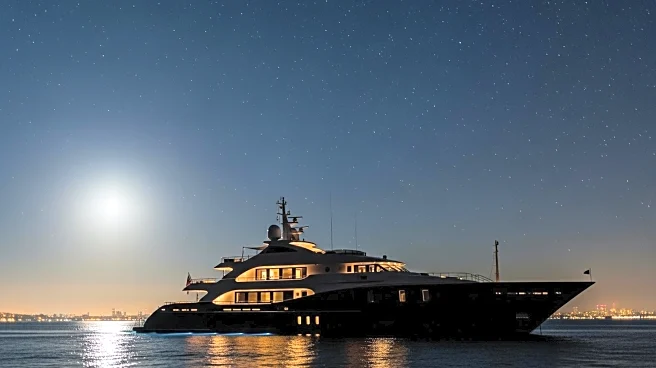What's Happening?
The U.S. Department of Justice (DOJ) is auctioning off the Amadea, a 348-foot megayacht, which was seized in Fiji in 2022. This action is part of a broader effort by a task force to hold Russian individuals with ties to the Kremlin accountable following Russia's invasion of Ukraine. The yacht's owner, Suleiman Kerimov, a Russian oligarch who amassed his wealth in gold, is accused of violating U.S. sanctions. Prosecutors allege that Kerimov used the U.S. banking system to manage expenses for the yacht, which led to its seizure. The DOJ's decision to auction the yacht is a significant move in enforcing sanctions and ensuring compliance with international financial regulations.
Why It's Important?
The auctioning of the Amadea highlights the U.S. government's commitment to enforcing sanctions against Russian oligarchs amid geopolitical tensions. This action serves as a warning to other individuals who might attempt to circumvent sanctions, emphasizing the U.S.'s resolve in holding violators accountable. The sale of the yacht not only aims to penalize Kerimov but also to deter similar actions by others. This move could impact the luxury asset market, as it underscores the risks associated with owning high-value assets under scrutiny. Additionally, it reflects the broader international effort to isolate Russia economically and politically in response to its actions in Ukraine.
What's Next?
The auction of the Amadea is expected to attract significant interest from potential buyers, given its size and luxury status. The proceeds from the sale could potentially be used to support Ukraine or other initiatives aligned with U.S. foreign policy objectives. The DOJ may continue to target other assets linked to sanctioned individuals, further tightening the economic pressure on Russia. This could lead to increased scrutiny of financial transactions involving Russian nationals and their assets, potentially affecting international banking and trade relations.
Beyond the Headlines
The seizure and auction of the Amadea raise questions about the ethical implications of luxury asset ownership amid global conflicts. It highlights the intersection of wealth, power, and international law, prompting discussions on the responsibilities of wealthy individuals in global crises. The case also underscores the role of international cooperation in enforcing sanctions, as the yacht was seized in Fiji, demonstrating the global reach of U.S. legal actions.










